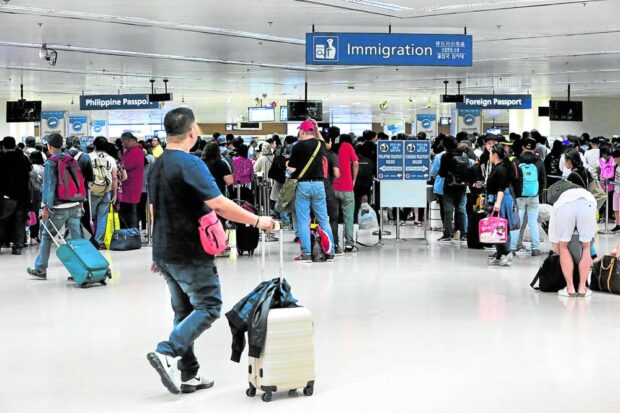Senators seek probe of ‘fake’ Filipinos entering country

Arriving passengers queue at the immigration counters of the Ninoy Aquino International Airport (Naia) Terminal 1 on Sunday, Aug. 8, 2018. (File photo by GRIG C. MONTEGRANDE/ Philippine Daily In
MANILA, Philippines — Senators on Monday raised the need to investigate the reported entry into the country of Philippine passport-bearing foreigners whose travel documents turned out to be fraudulent.
Senate Minority Leader Aquilino Pimentel III expressed concern over the admission by the Bureau of Immigration (BI) that it had rounded up 10 people who tried to use passports that the agency had described as “fraudulently issued.”
“I join the call of Senator (Nancy) Binay for the NBI (National Bureau of Investigation) to get to the bottom of this,” Pimentel said, noting that the disclosure exposes the supposed weakness of the Philippines’ passport system.
Awaiting deportation
“[This scheme has] allowed the issuance of travel documents which [one] can use to prove that he or she is a Filipino, and availing of [a privilege] reserved only to Filipinos,” he added.
Senators were reacting to an admission by Immigration Commissioner Norman Tansingco that agents this year had intercepted 10 foreigners who apparently held genuine Philippine passports.
Article continues after this advertisementThe issue came to light as the senators were briefed on the proposed 2024 budget of the Department of Justice (DOJ) and its attached agencies amounting to P34.5 billion.
Article continues after this advertisementAccording to Tansingco, the suspects drew suspicion from BI agents because of their “appearance” and their inability to speak in Filipino.
Upon verification, eight of the 10 foreigners were found to possess genuine Philippine passports that they claimed to have been “just handed over to them,” the BI chief said.
The foreigners, Tansingco said, are in the BI’s custody and awaiting deportation to their last known country of origin based on their immigration records.
Pimentel lamented that the information could have been earlier disclosed to the Senate as it tackled Senate Bill No. 2001, or the proposed New Philippine Passport Act, that the chamber approved on Sept. 25.
National security issue
“We could have pursued this matter deeply during the deliberations,” he said.
Sen. Ronald dela Rosa, chair of the Senate Committee on Public Order and Dangerous Drugs, is worried over the disclosure, saying it can be considered a national security issue.
“If 10 were intercepted, we can’t help but wonder how many were not?” asked Dela Rosa, a former Philippine National Police chief.
“This is really a national security issue because before we even know it, boom! They are already in the country and they complete their mission,” he said, without elaborating.
Syndicates
Dela Rosa said the NBI should follow indications that this scheme is operated from within the Department of Foreign Affairs (DFA), the sole agency tasked with issuing Philippine passports.
“We need to flush out who is their contact from within the DFA,” he added.
Binay, chair of the Senate committee on tourism, urged the BI to dig deeper into the controversy, as she suspected that syndicates under Philippine offshore gaming operators (Pogos) were exploiting the Philippines’ passport system to enter the country illegally.
“We need to trace their gateway to how they got here. We in the Senate would be interested to find out if this (system flaw) is causing an influx of foreigners who come in the guise of tourists but end up as Pogo workers,” she said.